Key takeaways:
- Freedom of information laws enhance government transparency and accountability, empowering citizens to access crucial information.
- Transparency facilitates informed public discourse, deters corruption, and encourages civic engagement in a democracy.
- Challenges include bureaucratic reluctance, resource limitations, and ambiguous terminology, hindering effective information access.
- Advocacy for information rights is evolving, with grassroots movements and technology playing key roles in enhancing transparency and citizen empowerment.
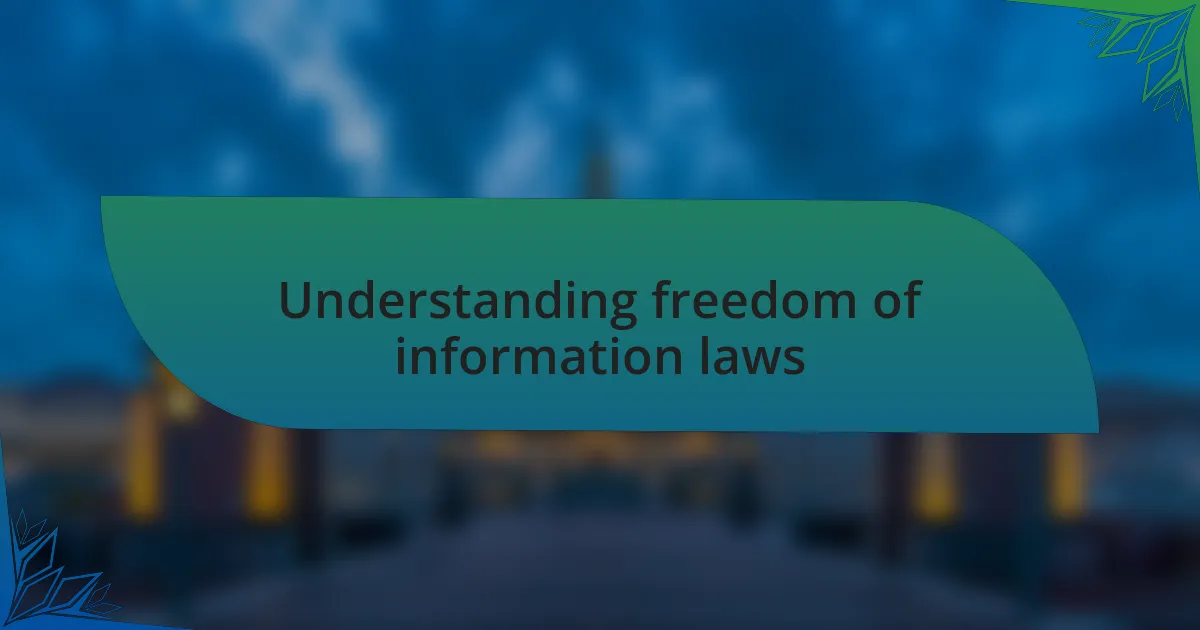
Understanding freedom of information laws
Freedom of information laws are designed to promote transparency and accountability in government. I often reflect on how these laws empower citizens to access documents that influence public policy and decision-making. It’s a vital tool for democracy, allowing us to see the inner workings of our government.
I remember the first time I utilized a freedom of information request. I was both excited and a bit apprehensive, wondering if my request would be met with resistance. This experience showed me firsthand the importance of these laws; they aren’t just regulations but a pathway for the public to hold power to account.
What if access to information transforms the relationship between citizens and their government? These laws can reveal hidden truths and stir public debates that ultimately lead to meaningful change. My belief is that every request—big or small—can shine a light on the governance processes and encourage a more informed citizenry.
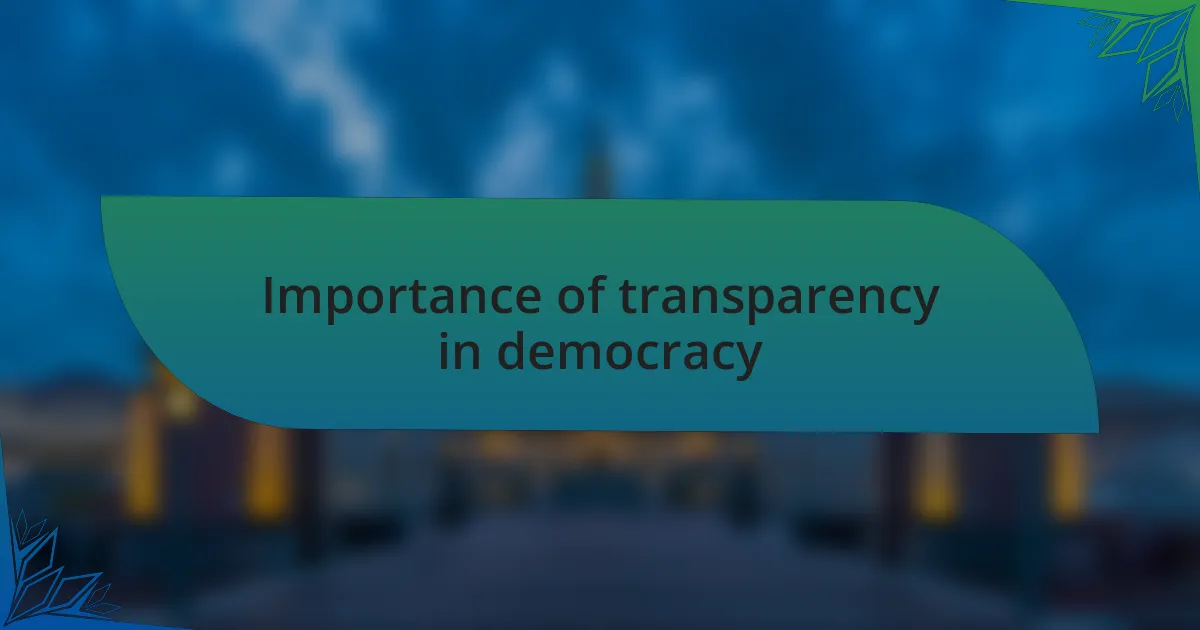
Importance of transparency in democracy
Transparency is not merely a buzzword in democracy; it’s the backbone of trust between the government and its citizens. When I think about instances where the public was kept in the dark, it irritates me. Just imagine how different our political landscape would be if citizens had unfettered access to decision-making processes. It’s as if transparency acts like a light in a dark room, revealing the corners and allowing us to fully understand the motives behind policies.
I recall a public meeting I attended where several important decisions were being discussed without adequate information being shared. The frustration in the room was palpable. It made me realize how transparency facilitates informed public discourse; when people are privy to the rationale behind policies, they can engage in meaningful conversations rather than merely reacting to news headlines. Isn’t it essential that we, as citizens, feel informed and empowered to participate in our democracy?
Moreover, transparency can serve as a deterrent against corruption and abuse of power. By allowing the public to scrutinize processes and decisions, we foster a culture of accountability. I’ve seen communities rally together over once-hidden issues, forcing change that has made our government more responsive. Is it any wonder that when citizens feel they have a say, they are more likely to engage in civic activities? The answer is clear: transparency nurtures a vibrant democracy where every voice matters.
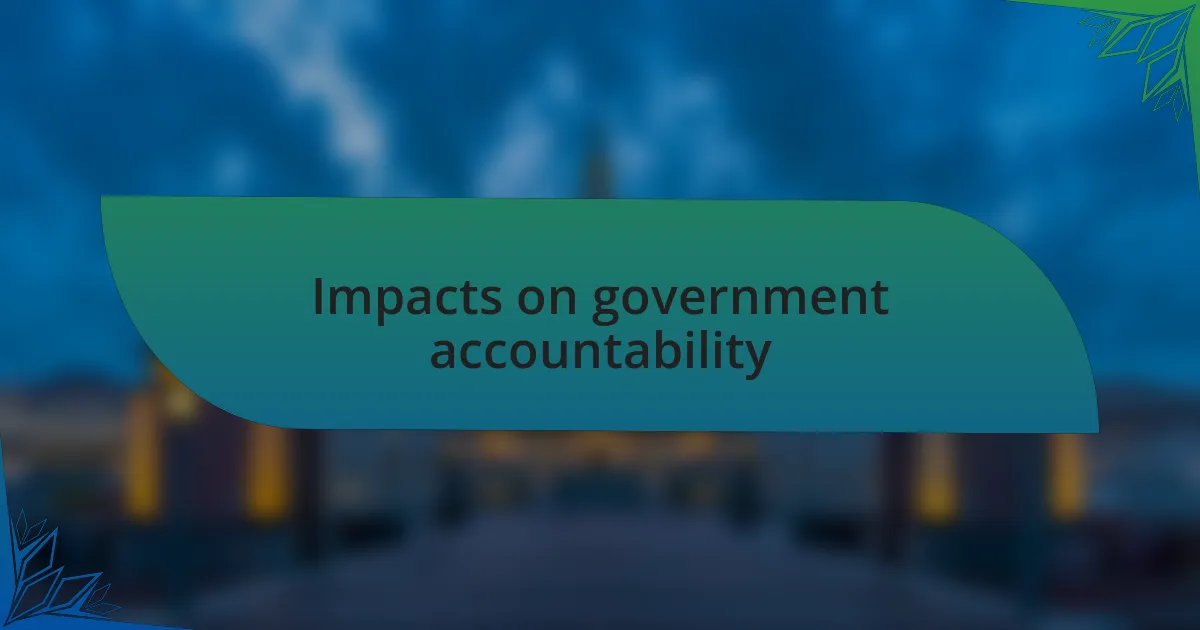
Impacts on government accountability
The implementation of freedom of information laws significantly elevates government accountability by enabling citizens to access crucial information about public actions and policies. I recall a time when I used a freedom of information request to uncover details about local budget allocations. The findings not only unveiled discrepancies but also initiated a community discussion that pressured local leaders to justify their financial decisions. Doesn’t it strike you as powerful how a single request for information can lead to tangible change?
Furthermore, these laws compel government officials to be more diligent in their decision-making processes. When I think about how public servants can’t hide behind closed doors anymore, I feel a sense of empowerment. It’s as if they are reminded that their choices are subject to scrutiny, which, in my opinion, cultivates a more responsible approach to governance. How can we expect leaders to act with integrity if they know their actions are invisible to the public eye?
In my experience, the mere existence of these laws can encourage a proactive rather than reactive approach to governance. I’ve seen how municipalities and state agencies have improved their transparency practices simply because they understood that citizens are now watching closely. It makes me wonder, if everyone adopted this mindset, how many more injustices could be uncovered and addressed? The path to a more accountable government is lit by the light of informed engagement, spurred on by the rights we claim through freedom of information laws.
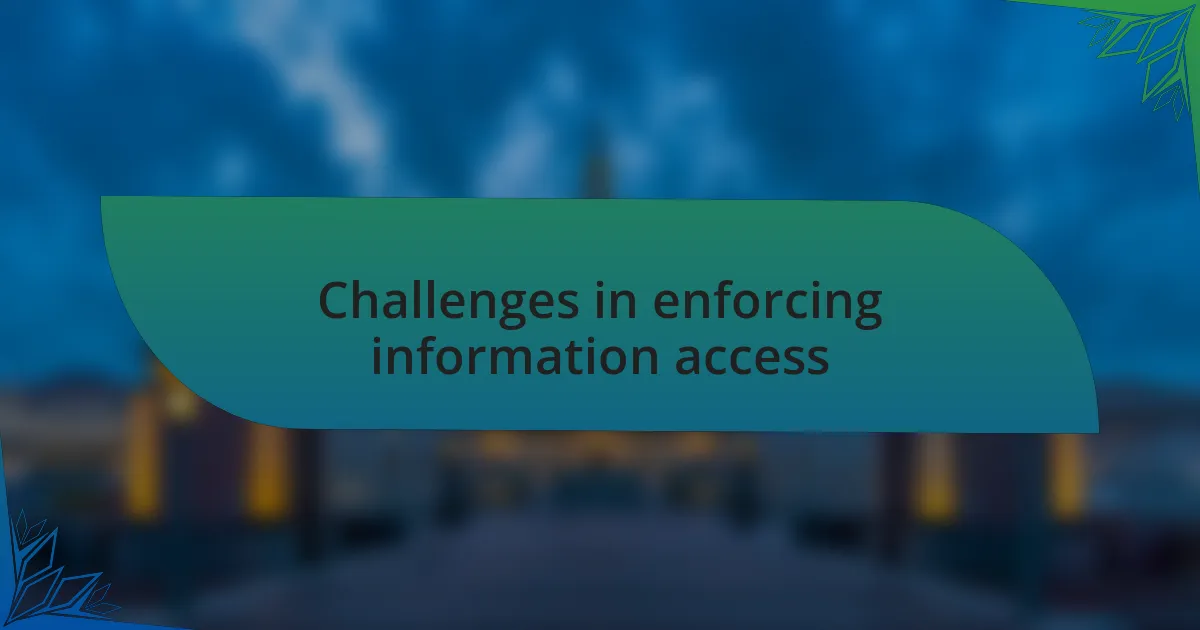
Challenges in enforcing information access
Enforcing information access often feels like an uphill battle. One challenge I’ve encountered is the reluctance from some agencies to fulfill requests, citing ambiguous reasons like “administrative burden.” I remember submitting a request that took months to process, only to receive redacted documents that felt less like the transparency promised and more like a frustrating puzzle. Have you ever felt the sting of being kept in the dark, even when the laws intended to bring light?
Another significant hurdle is the lack of resources allocated for managing information requests. Many public agencies operate with limited staff and funding, which can slow down the process to a crawl. I once spoke to a state employee who was handling dozens of requests at once, making it clear that the system was strained. When the very people tasked with upholding transparency are overwhelmed, how can we expect them to fulfill their responsibilities effectively?
Moreover, the terminology used in these laws can be a barrier itself. Terms like “public interest” are often subjective, leaving room for interpretation and potential misuse. I’ve seen officials selectively disclose information, arguing that certain details are not in the public interest, which only heightens frustration for those seeking clarity. Isn’t it puzzling how, in a system designed to enable access, the language can become an obstacle rather than a bridge to accountability?
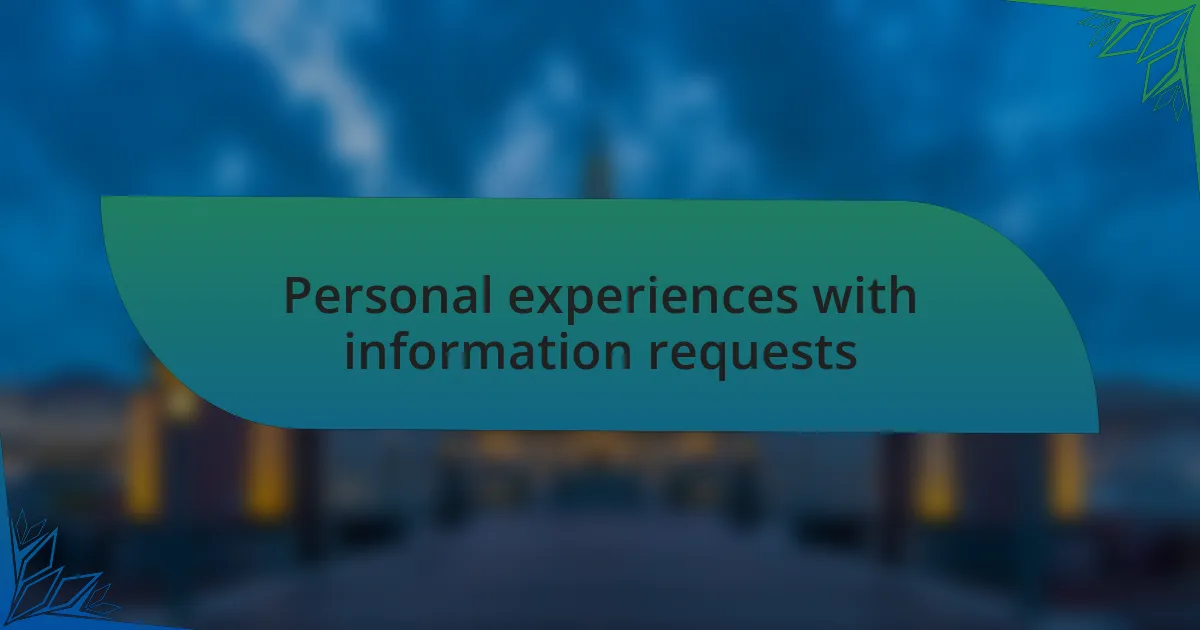
Personal experiences with information requests
Submitting my first information request was a revealing experience. I felt a mix of curiosity and apprehension as I pushed “send” on my email, wondering if my request would go unnoticed. When I finally received a response, it was a mere fraction of what I had hoped for, leaving me to wonder whether the process was designed to empower citizens or just to provide a façade of transparency.
One request I made related to local government spending caught me off guard. Days turned into weeks, and I kept checking my inbox, feeling both eager and anxious. Eventually, the document arrived, significantly redacted. Honestly, it felt like receiving a gift wrapped in layers of tape—you know there’s something valuable inside, but you can’t access it. Have you ever longed for clarity, only to be given confusion instead?
In another instance, I connected with a fellow requester who shared their experiences. Hearing their stories of persistence, filled with frustration and small victories, deepened my understanding of the collective struggle we share. It made me realize just how vital it is to advocate for our right to know—after all, shouldn’t we be able to peel back the layers of bureaucracy and see what’s truly happening in our communities?
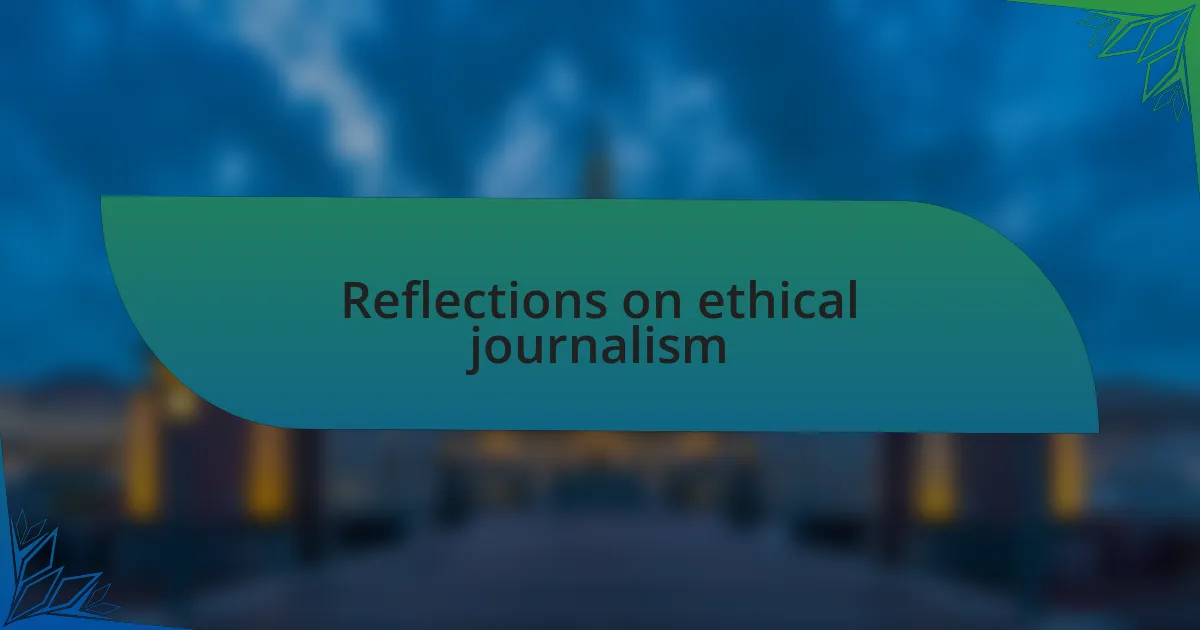
Reflections on ethical journalism
Ethical journalism stands as a cornerstone of democracy, and it’s something I’ve reflected on deeply throughout my experiences. I remember speaking at a local event on the role of journalists in holding power accountable. As I engaged with the audience, I could feel the weight of responsibility that journalists carry—not just to report the facts, but to do so with integrity and transparency. Isn’t it essential that they navigate the fine line between public interest and personal privacy?
In one conversation with a seasoned reporter, we discussed the challenges of sourcing information ethically. They shared a poignant story about uncovering critical data that revealed misconduct, but it came at a cost—both personally and professionally. That moment crystallized for me how ethical dilemmas can haunt reporters; it begs the question: what happens when the truth puts lives at risk? This conversation reaffirmed my belief that ethical journalism isn’t just about what’s reported; it’s about how and why specific information is revealed.
I’ve also encountered instances where sensationalism threatened to overshadow the truth in media coverage. I recall a piece that went viral but lacked context, sensationalizing a local protest without delving into the underlying issues. It made me ponder how easily stories can be distorted when ethical considerations take a back seat. In those moments, I realized that ethical journalism demands a commitment to not only report but to educate and inform, fostering a more thoughtful public discourse.
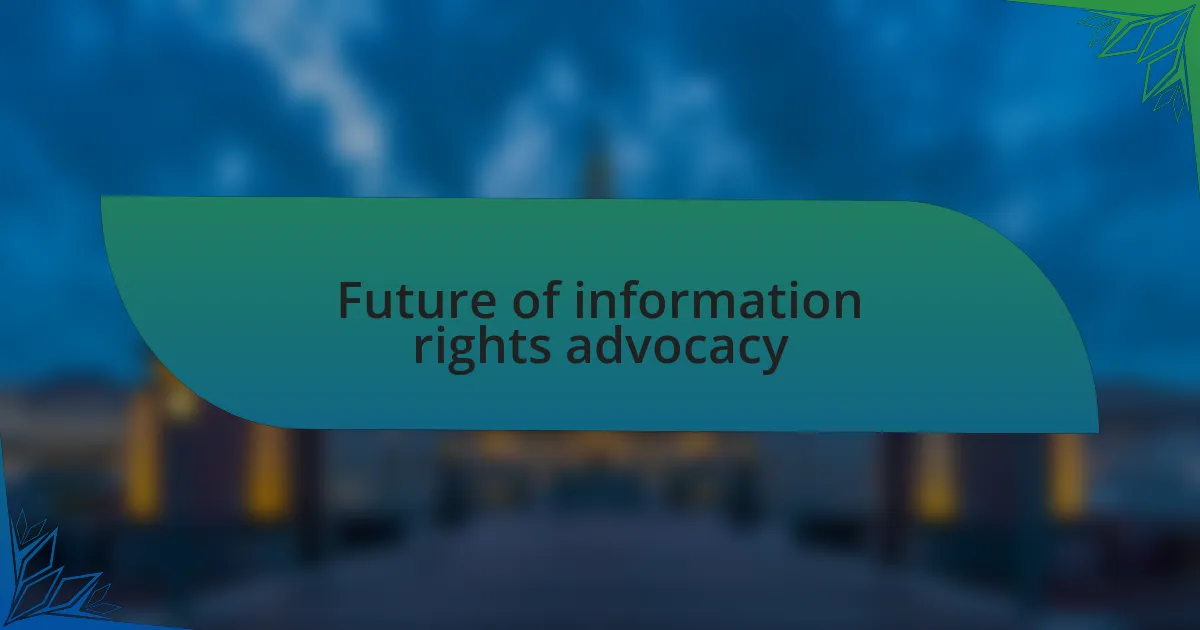
Future of information rights advocacy
Advocacy for information rights is poised for significant evolution in the coming years. I can envision grassroots movements growing stronger as more people recognize the importance of transparency in governance. In a recent discussion with a community organizer, they emphasized how citizens are beginning to demand access to information that affects their lives, sparking a shift in the way organizations advocate for these rights. Can we underestimate the power of an informed public in shaping policy?
Looking ahead, technology will undoubtedly play a pivotal role in information rights advocacy. As I’ve observed in my own experiences, tools that facilitate whistleblowing and secure communication are increasingly accessible, allowing advocates to gather and disseminate information more effectively. Just think about the implications: with a mere smartphone, individuals can shine light on issues that would once have slipped under the radar. How will this reshape the dynamics between citizens and their governments?
In my opinion, collaboration among diverse stakeholders will be essential for advancing information rights. I recall a conference where journalists, activists, and tech developers came together to brainstorm solutions for greater transparency. The synergy sparked creativity, and it left me feeling inspired. It’s clear to me that when we unite various perspectives and expertise, we can create a more robust framework for safeguarding our rights to information. What collective actions will emerge from this collaboration in the future?